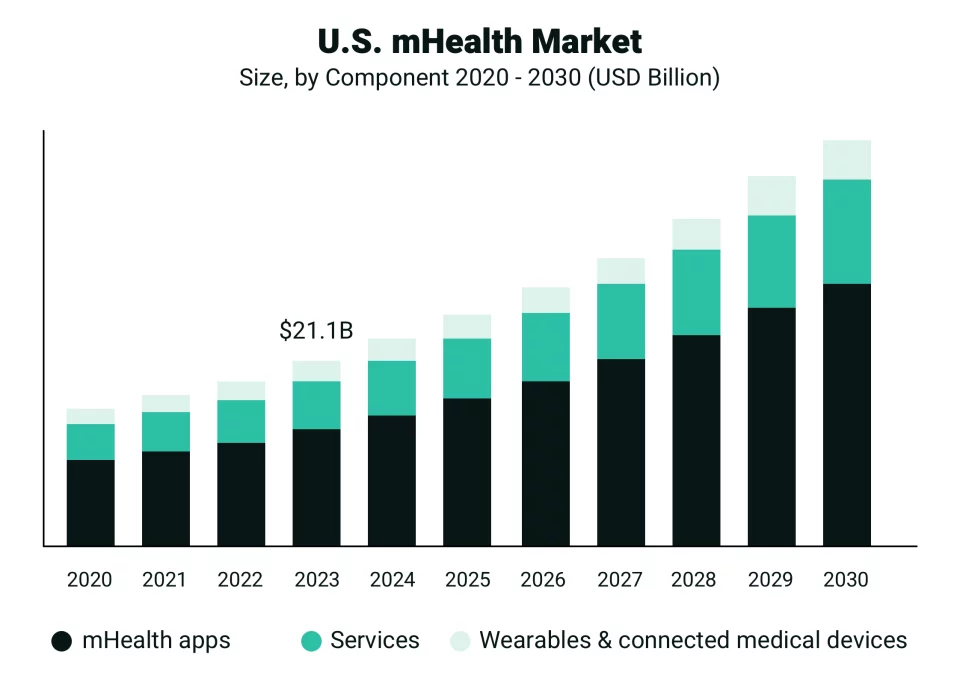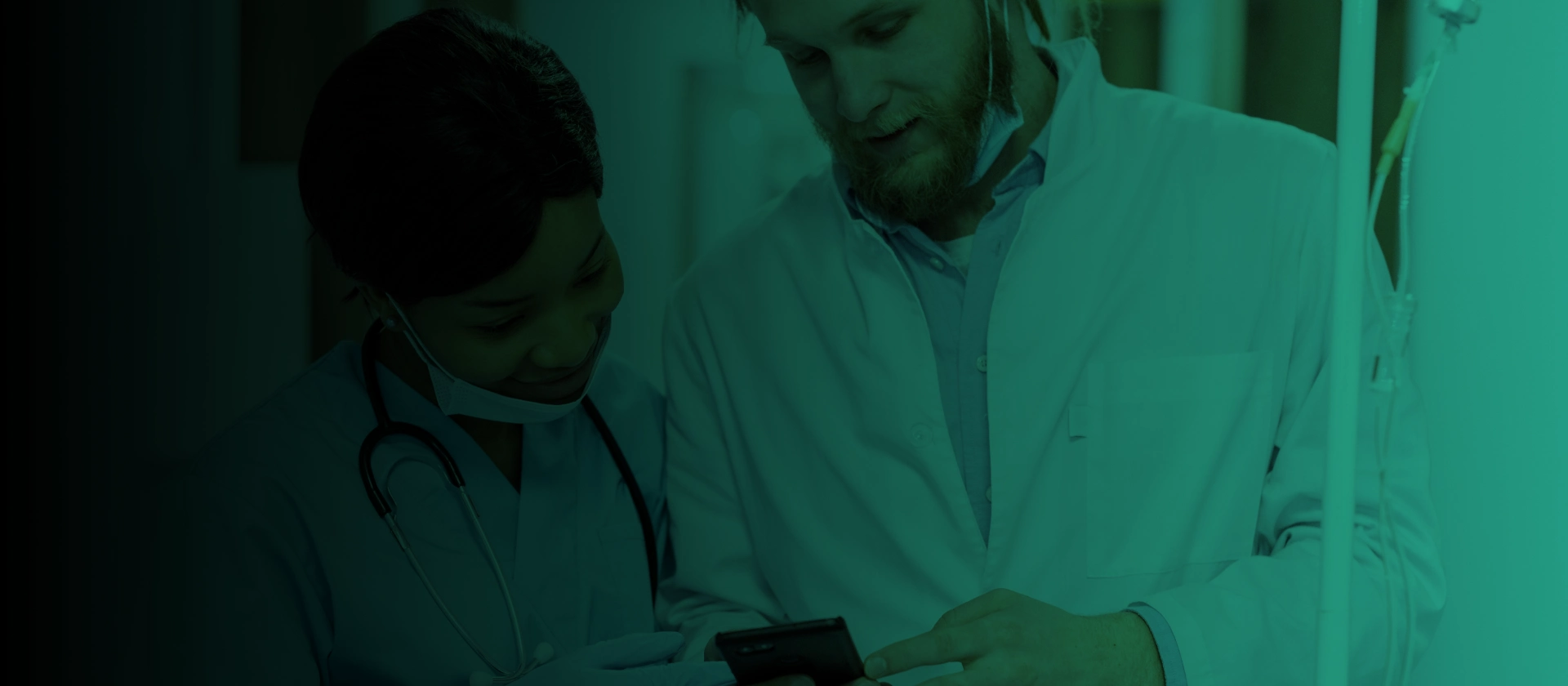INTRODUCTION
App development in healthcare: Increasing adoption of technology improves healthcare services
The burgeoning popularity of smartphones has heralded a transformative era in the medical world, seamlessly integrating mobile technology into healthcare practices. This integration has not only facilitated accessibility but has also catalyzed the expansion of application development across the healthcare industry. Today, a comprehensive understanding of healthcare is incomplete without acknowledging the pivotal role of mobile applications in storing and managing medical information, thereby bridging the gap between healthcare providers and patients.
The pervasive influence of technology extends across every facet of the digital health ecosystem, revolutionizing how healthcare services are accessed and delivered. From the comfort of one's home, individuals can now consult certified doctors, order medications, and access their medical records with unparalleled ease. Furthermore, technological innovations such as robotic-assisted surgeries have reshaped conventional approaches to medical procedures. This technological revolution has not only transformed the delivery of medical services but has also redefined perceptions and accessibility in healthcare.
At the heart of this paradigm shift lies the fundamental principle of patient-centricity. App development in healthcare has fundamentally shifted the industry's focus towards patients, fostering a more personalized and tailored approach to healthcare delivery. This shift towards patient-centric care is made possible by the digital revolution facilitated by custom healthcare software development. Moreover, app development's consistent growth and evolution drive innovations and improvements within the medical field.
Mobile app development has transcended geographical barriers, enabling seamless communication and access to healthcare services irrespective of location. In this digital era characterized by rapid technological advancements, understanding the significance of healthcare mobile app development is paramount for staying ahead in an increasingly competitive landscape. By serving as a stepping stone to a more interconnected healthcare ecosystem, mobile app development heralds a future where healthcare services are universally accessible and seamlessly integrated into individuals' lives.
CHALLENGES
Addressing common challenges faced in healthcare delivery
The definition, delivery, and discovery of health and wellness have undergone a tectonic shift post-COVID-19, particularly in doctor consultations and remote health monitoring. No matter how fixed a person or organization was in its ways, the pandemic shook things up and took healthcare delivery up a notch by witnessing the launch of custom healthcare development. In this scenario, app development was crucial in delivering on-time healthcare services. However, this is just the tip of the iceberg.
Undoubtedly, the pandemic opened a sea of opportunities for healthcare organizations, who were quick to jump on the bandwagon and explore the world of custom healthcare app development. But even with multiple benefits, custom healthcare development poses several challenges that demand urgent attention from the healthcare fraternity.
- Fragmentation of healthcare systems - The way healthcare organizations store patient information often lacks organization and coherence. This fragmentation often risks duplication, gaps, and ineffective treatment outcomes, leading to disorganization and inefficiencies in hospital information management systems.
- Lack of patient adherence - Despite technological advancements, many patients struggle with adherence to treatment plans due to a lack of self-discipline. This non-adherence frequently leads to poor health outcomes and increased hospital readmissions, highlighting the need for improved patient engagement strategies.
- Digital divide and accessibility - The digital divide remains a harsh reality, with billions of individuals lacking access to smartphones and mobile healthcare apps. This digital disparity underscores the importance of developing digital health products that demonstrate inclusive solutions to cater to the diverse needs of all individuals, regardless of their technological proficiency.
- Observing rules and regulations - The healthcare industry is heavily regulated. More importantly, these regulations do not often align with the pace of technological advancements that drive healthcare app development in the industry. Hence, it becomes difficult for organizations to stay abreast of the latest technological advancements while complying with regulatory requirements.
- Limitations in emergencies - While virtual consultations offer convenience for non-emergency cases, they are inadequate for urgent medical situations, necessitating physical visits to healthcare facilities. Also, even if you have access to your medical data, you can only interpret it according to the advice mentioned in the first few pages of Google. You need regular consultation with a healthcare professional to notice a pattern or make sense of your health data.
Although the healthcare world is not a bed of roses for integrating technological practices into the existing healthcare system, custom app development services have the potential to address these multifaceted challenges.
BENEFITS
Explore the benefits of healthcare app development for patients and healthcare organizations
Mobile healthcare apps, or mHealth apps, represent a significant leap forward in modern healthcare, offering benefits that extend to patients, healthcare organizations, and all stakeholders involved. These apps are the ticket to a more connected, efficient, and patient-centric healthcare experience. In today’s time where convenience is key, mHealth apps empower people to navigate the intricacies of modern medicine with increased accessibility. Take a look at the benefits of mobile app development in the ever-evolving realm of healthcare.
Enhanced patient engagement and experience
mHealth apps prioritize patient-centricity, revolutionizing how healthcare services are delivered and accessed. With the advent of these apps, patients now have unprecedented access to their medical information, consultations, and test results, all at their fingertips. This technological revolution empowers patients to take an active role in their healthcare journey, leading to improved adherence to treatment plans and overall satisfaction with the care received.
Healthcare organizations meticulously study their patients' needs and backgrounds to craft applications that are seamlessly accessible across various platforms. When an application's user interface is intuitively designed and easy to navigate, patients are more inclined to actively engage in their healthcare journey. By empowering patients with a sense of ownership over their health management, mHealth apps foster greater adherence to treatment plans, enhancing the overall healthcare experience.
Streamlined operations and workflow
Custom mobile applications streamline administrative tasks, eliminating manual paperwork and reducing the incidence of human errors. Healthcare providers can automate routine billing, documentation, and appointment scheduling processes, ensuring operational efficiency and accuracy. Healthcare IT consulting firms' capabilities further enhance these efficiencies by building centralized platforms and minimizing errors through automation.
Improved communication and collaboration among healthcare teams
All healthcare team members, including doctors, nurses, specialists, surgeons, and support staff, remain aligned and informed thanks to the seamless data integration offered by healthcare apps. For instance, if a nurse has to check whether a patient is allergic to something, they find this information in the patient’s health record stored in the respective mHealth app, or if a urologist has to check the medication prescribed by a nephrologist, they can check the patient’s prescription on the app itself. Since all information related to a patient (present and history) is stored methodically in one place, healthcare teams can collaborate more efficiently and make well-informed decisions, ultimately leading to improved patient engagement and health outcomes.
Furthermore, healthcare mobile apps can integrate features like video conferencing, team calendars, and task assignments. These features can improve coordination and communication among healthcare teams across different departments.
Better data management and analytics
mHealth apps offer robust data management and advanced analytics solutions in healthcare, enabling healthcare organizations to glean actionable insights from health data. By leveraging these insights, organizations can optimize resource allocation, identify areas for improvement, and deliver personalized care to enhance patient satisfaction. Integrating electronic health record (EHR) systems and blockchain technology ensures the security and integrity of patient data while facilitating informed decision-making and data-driven strategies.
SUCCESS STORIES
Highlighting the real-world applications of mobile app development
Highlighting the real-world applications of mobile app development, Asahi Technologies demonstrates its commitment to innovation and transformation in healthcare. Through strategic planning and meticulous execution, we have spearheaded projects that revolutionize healthcare organizations, streamline workflows, and elevate patient outcomes.
HealthOps - Digitizing paper-based audits
In a transformative collaboration with Boston Children’s Hospital (BCH), we addressed the inefficiencies of BCH’s manual audit process by digitizing paper-based audits of hospital equipment. Recognizing the need for accuracy and efficiency, we developed a role-based application for administrators, managers, and auditors.
The application empowered managers to oversee audits and analyze metrics via a dashboard, allowed auditors to conduct inspections, and enabled administrators to generate reports with collected data. Our team incorporated vital features such as graphs, notifications, offline access, and multi-platform compatibility to enhance operational effectiveness.
Despite challenges, including integrating barcode scanning compatibility across all mobile devices and meeting specific client requirements for chart functionality, we successfully delivered an innovative software solution. We have demonstrated our ability to drive meaningful change in healthcare organizations by eliminating human errors and enhancing client satisfaction.
Nutreetion - Developing a customized meal-planning app
In collaboration with a fitness startup, Nutreetion, Asahi Technologies addressed the challenge of manual meal planning by equipping them with a mobile application. Nutreetion sought to transition from cumbersome Excel sheets to a more efficient and user-friendly solution. We stepped in as the ideal technology partner, developing an intelligent fitness and wellness app tailored to Nutreetion's unique requirements.
The client specified several challenges for us to overcome:
- Factor in the height, weight, and dietary preferences of customers.
- Include vegetarian and vegan options and observe allergies or simple dislikes.
- Calculate macro/micronutrient needs.
- Generate meal plans in both metric (ml and fl. oz) and imperial systems (kg and lbs.) as well as in two languages (English & French).
In response to these challenges, our team embarked on a mission to create a UI-focused app for American and European audiences. The team went through the following phases:
- Discovery phase
- Designing phase
- Working phase
- Testing phase
- Launch phase
We garnered high praise from the client, who appreciated the mobile app's responsive design and smooth working. Most importantly, the client's work generating a single meal plan reduced drastically to 10-15 minutes from 10-15 hours.
KEY FEATURES
Uncovering the key features that make or break mHealth apps
Mobile healthcare apps are new-age tools that facilitate more accessible communication between patients and healthcare providers. In today's fast-paced healthcare landscape, characterized by a blend of innovation and necessity, these apps have transitioned from mere conveniences to essential components in accessing healthcare services. In today’s era, where instant gratification reigns supreme, convenience and efficiency are paramount. Let us delve into the key features of healthcare mobile app development, where we will uncover the critical elements that underpin their effectiveness.
Security and compliance
Central to the functionality of any healthcare app is its commitment to data privacy and security. These apps store sensitive medical and personal information, so robust security measures are paramount. Companies must invest in experts and digital health app developers who perform penetration testing and regular security audits and adhere to strict compliance standards to ensure that patient data remains confidential and protected against unauthorized access or breaches.
User-friendly interface
At the heart of a well-developed mobile application lies an easy-to-navigate user interface designed to simplify the lives of patients already grappling with medical issues. The user interface of a mobile healthcare application should not be a code that you have to crack. Instead, it should resemble a clear road map guiding users from one point to another. The easiest way to go about an application's user interface is by adopting the 'less is more' technique.
People choose custom healthcare solutions to simplify routine tasks. Hence, mHealth apps should speak the language of simplicity and accessibility. A user must feel relaxed at the thought of opening a healthcare application. There should be a feeling of ease associated with their healthcare journey.
Integration capabilities with existing systems
Effective healthcare app development hinges on robust integration capabilities, serving as the linchpin that consolidates data sources within an organization. Successful healthcare app development leverages integration with existing systems such as telemedicine platforms, wellness apps, and EHRs to set the scene for compact, comprehensive, and continued patient care. Access to patient information should be barrier-free, with healthcare providers having instant access to all relevant medical data on a single platform.
Moreover, in an era dominated by interconnectivity, the success of a mobile healthcare application hinges on its ability to run seamlessly across all platforms. From mobile phones to laptops to smartwatches, the app should offer a cohesive user experience, ensuring accessibility and usability across diverse devices.
Future trends
Exploring technological trends that will drive the future of the healthcare industry
We can see a fast-moving, technologically-driven landscape as we peer into the crystal ball of healthcare app development. Addressing patient needs compassionately and automating routine tasks form the center of the ongoing transformation in the healthcare realm. According to Precedence Research, the global hospital services market is expected to reach around USD 22.57 trillion by 2033 and is most likely set to grow at a CAGR of 6.04% from 2024-2033.
AI-powered diagnostics, telemedicine, and wearable technology are the main elements forming the next wave of innovation in the healthcare sector. Virtual doctor consultations were once a distant dream but stand as reality today. Remote consultations prove that the entire healthcare approach is patient-centric, bringing the doctor's office to the patient's doorstep rather than the patient stepping out to visit the doctor. Ten years ago, no one could imagine AI-powered diagnostics analyzing patient health data. But today, AI is emerging as a game-changer, unlocking new possibilities for early detection and accurate diagnosis. Wearable technology is gaining momentum, heralding the era of the Internet of Medical Things (IoMT), wherein real-time health data transmission enables healthcare providers to monitor the data around the clock. An array of wearable devices embedded with sensors tracks vital signs such as heart rate, sleep patterns, oxygen levels, and activity levels. These devices are connected to mobile healthcare apps from where you can view your health status and take action based on relevant insights.
We call healthcare apps new-age tools today, but in the future, they will become trusted companions of patients in their healthcare journeys. Healthcare app development has shifted from novelty to necessity. Whether you call it a mHealth revolution or a technological evolution, healthcare apps herald a new era of innovation, empowering individuals with unprecedented control over their health and well-being.
A report by Grand View Research predicts that by 2030, the U.S. mHealth market size will be estimated at $84-88 billion.

mHealth apps will lead the charge in global HealthTech services
WHY ASAHI
Asahi employs a team that is skilled at solving complex healthcare challenges
Asahi Technologies is a top healthcare software development company offering end-to-end solutions driven by a singular mission - drive better medical outcomes. It is an industry leader with technical knowledge and domain expertise in developing custom software solutions to create compelling results. We do not implement random solutions. Instead, it collaborates with you to develop a functional roadmap that brings your vision to life most efficiently. We have highlighted below the unique value propositions Asahi offers to leverage your brand and position you for success in the competitive healthcare landscape.
Expertise in healthcare-specific software development
We have positioned ourselves as a champion in healthcare app development services. It empowers your organization to undergo a digital transformation and reach new heights of efficiency, effectiveness, and innovation in healthcare delivery. We very well understand that every organization is unique in its vision, goals, strengths, and challenges. Hence, every organization deserves a case-specific solution. With years of experience in healthcare software solutions, we leverage our expertise to address your needs.
Compliance with industry regulations (HIPAA, GDPR)
We are renowned for our unwavering commitment to industry regulations, including the Health Insurance Portability and Accountability Act (HIPAA) and the General Data Protection Regulation (GDPR). Our steadfast dedication to safeguarding patient health data is reflected in our compliance practices. We implement stringent data encryption protocols and conduct regular security audits to ensure compliance with regulatory requirements.
Customized solutions tailored to client needs
Our team of experts, equipped with technical prowess and industry insights, is dedicated to addressing your unique requirements. Unlike one-size-fits-all solutions, we delve deep into your organization's intricacies, comprehending workflows, objectives, and challenges to deliver bespoke solutions that optimize resources effectively. Moreover, we anticipate future needs and adapt solutions to navigate the dynamic healthcare landscape.
Comprehensive support throughout the development journey
We employ remote, hybrid teams proficient in full-stack software development. From initial consultation to product deployment and beyond, we stand by your side, offering comprehensive support at every stage of the development journey.
Whether you seek cost-effectiveness or a solution deeply aligned with your organization's ethos, we are committed to meeting your needs from day one.
CONCLUSION
App development is widely accepted as one of the best practices in healthcare today
In today's time, app development has emerged as an indispensable tool for healthcare providers as they must take advantage of every opportunity that helps them improve patient satisfaction and outcomes. As the healthcare landscape evolves and transforms, these apps offer myriad benefits for all stakeholders that cannot be replaced by manually driven work. The need for app development transcends beyond convenience; it is the new way forward in healthcare delivery. By embracing technological innovation, healthcare providers can adapt to the evolving needs of patients and stakeholders, ultimately driving better medical outcomes and advancing the quality of care.
Most Common Questions People Also Ask (PAA) on Google:
- What are the benefits of healthcare app development?
App development benefits healthcare providers by streamlining administrative tasks, improving collaboration among healthcare teams, and enabling data analytics and report generation. It also empowers patients by offering access to their consolidated health data and assists them in scheduling appointments and consulting doctors remotely. - How can healthcare apps improve patient outcomes?
Patients have direct access to their medical data in healthcare apps. These apps provide constant reminders and alerts that help patients stick to their treatment plans. Also, healthcare apps enable doctors and physicians to identify trends and patterns, which in turn paves the way for early disease detection, timely medical intervention, and quick diagnosis. - What features should a healthcare app include?
A healthcare app should have a user-friendly interface so users don’t have to scratch their heads while using it. Mobile apps must be developed to comply with HIPAA and GDPR requirements. Another essential feature healthcare apps should have is seamless integration capabilities. - How does app development enhance operational efficiency in healthcare?
Mobile apps reduce dependence on manual work. mHealth apps help automate routine tasks like appointment scheduling, calendar updates, billing, documentation, and registration. Healthcare apps also offer data-driven insights and analytics that aid healthcare providers in maximizing resource utilization and supporting enhanced productivity. - Which regulations should healthcare apps comply with?
Healthcare apps should ideally comply with the Health Insurance Portability and Accountability Act (HIPAA) and the General Data Protection Regulation (GDPR). Complying with these regulations safeguards sensitive data, builds patient trust, and avoids legal penalties.






